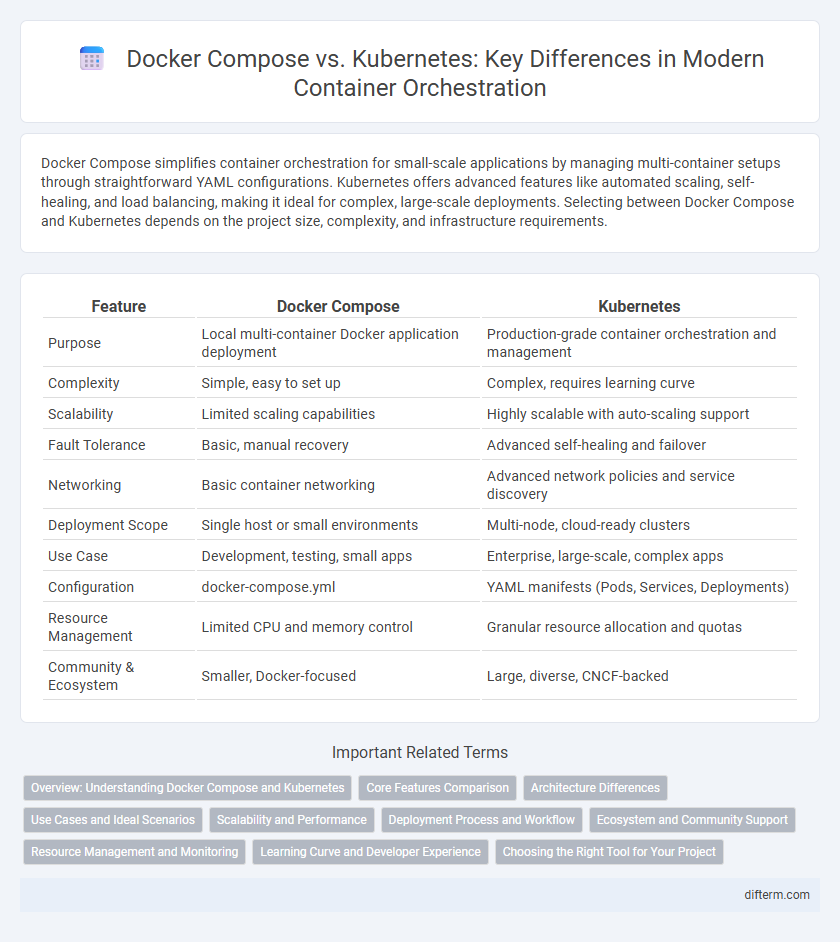Docker Compose simplifies container orchestration for small-scale applications by managing multi-container setups through straightforward YAML configurations. Kubernetes offers advanced features like automated scaling, self-healing, and load balancing, making it ideal for complex, large-scale deployments. Selecting between Docker Compose and Kubernetes depends on the project size, complexity, and infrastructure requirements.
Table of Comparison
| Feature | Docker Compose | Kubernetes |
|---|---|---|
| Purpose | Local multi-container Docker application deployment | Production-grade container orchestration and management |
| Complexity | Simple, easy to set up | Complex, requires learning curve |
| Scalability | Limited scaling capabilities | Highly scalable with auto-scaling support |
| Fault Tolerance | Basic, manual recovery | Advanced self-healing and failover |
| Networking | Basic container networking | Advanced network policies and service discovery |
| Deployment Scope | Single host or small environments | Multi-node, cloud-ready clusters |
| Use Case | Development, testing, small apps | Enterprise, large-scale, complex apps |
| Configuration | docker-compose.yml | YAML manifests (Pods, Services, Deployments) |
| Resource Management | Limited CPU and memory control | Granular resource allocation and quotas |
| Community & Ecosystem | Smaller, Docker-focused | Large, diverse, CNCF-backed |
Overview: Understanding Docker Compose and Kubernetes
Docker Compose simplifies multi-container Docker applications by allowing developers to define and manage services through a single YAML configuration file, ideal for local development and small-scale environments. Kubernetes, a powerful container orchestration platform, automates deployment, scaling, and management of containerized applications across clusters, providing high availability and advanced networking capabilities. Both tools use containerization but differ significantly in complexity, scalability, and use cases, with Docker Compose suited for simpler setups and Kubernetes designed for production-level, distributed systems.
Core Features Comparison
Docker Compose simplifies multi-container application management with straightforward YAML configuration, enabling fast orchestration on a single host, ideal for development and small-scale deployments. Kubernetes offers advanced core features such as automated scaling, self-healing, service discovery, and load balancing across multiple nodes, supporting complex production-grade container orchestration. The choice between Docker Compose and Kubernetes depends on requirements for scalability, fault tolerance, and distributed system management in cloud-native environments.
Architecture Differences
Docker Compose operates as a straightforward tool designed for defining and running multi-container Docker applications using a single YAML file, primarily suited for single-host environments. Kubernetes features a complex architecture with multiple components, including the API server, etcd, controllers, and schedulers, enabling orchestration and management of containers across clustered environments. While Docker Compose emphasizes simplicity and ease of use in developer workflows, Kubernetes provides robust scalability, high availability, and automated deployment in production-grade distributed systems.
Use Cases and Ideal Scenarios
Docker Compose excels in managing multi-container Docker applications on a single host, making it ideal for development, testing, and small-scale deployments. Kubernetes is designed for orchestrating large-scale, distributed containerized applications across clusters, offering advanced features like automated scaling, self-healing, and load balancing. Use Docker Compose for simpler environments with fewer containers and Kubernetes for complex, production-grade systems requiring high availability and scalability.
Scalability and Performance
Docker Compose excels in managing multi-container Docker applications in development environments, offering simplicity but limited scalability for production workloads. Kubernetes provides robust scalability with automated container orchestration, load balancing, and self-healing features, ensuring high performance under varying loads. In large-scale deployments, Kubernetes outperforms Docker Compose by efficiently managing resource allocation and dynamic scaling across clusters.
Deployment Process and Workflow
Docker Compose streamlines multi-container application deployment with simple YAML configurations, ideal for local development and small-scale environments. Kubernetes offers robust deployment workflows using declarative manifests, supporting automated rollouts, scaling, and self-healing across large, distributed systems. Kubernetes' advanced orchestration capabilities enable seamless management of container lifecycles, surpassing Docker Compose's more manual and straightforward deployment process.
Ecosystem and Community Support
Docker Compose offers a straightforward ecosystem with strong integration in individual developer workflows, making it ideal for small-scale container orchestration. Kubernetes boasts a vast, mature ecosystem supported by an extensive and active global community, providing a wide range of tools, plugins, and enterprise-grade features. The Kubernetes community's robust support accelerates innovation and problem-solving, ensuring long-term sustainability and scalability.
Resource Management and Monitoring
Docker Compose simplifies resource management by enabling developers to define and run multi-container applications with straightforward YAML configuration, ideal for small-scale environments. Kubernetes offers advanced resource allocation features such as automatic scaling, load balancing, and self-healing capabilities, which optimize performance in complex, distributed systems. Its robust monitoring tools integrate with Prometheus and Grafana, providing deep insights into cluster health, resource usage, and application metrics essential for enterprise-grade deployments.
Learning Curve and Developer Experience
Docker Compose offers a gentler learning curve with straightforward YAML configurations ideal for local development and small-scale deployments, enhancing developer productivity through simplicity. Kubernetes involves a steeper learning curve due to its complex architecture, extensive APIs, and resource management, but provides powerful orchestration capabilities essential for large-scale, production-grade environments. Developers benefit from Kubernetes' advanced features like automated scaling and self-healing pods, though initial setup and management require deeper container orchestration knowledge.
Choosing the Right Tool for Your Project
Docker Compose streamlines local development and small-scale container orchestration, making it ideal for simple applications and rapid prototyping. Kubernetes excels in managing complex, large-scale deployments with advanced features like automated scaling, self-healing, and service discovery. Selecting the right tool depends on project scale, complexity, and operational requirements, with Docker Compose suiting lightweight environments and Kubernetes fitting enterprise-grade infrastructure.
Docker Compose vs Kubernetes Infographic

 difterm.com
difterm.com